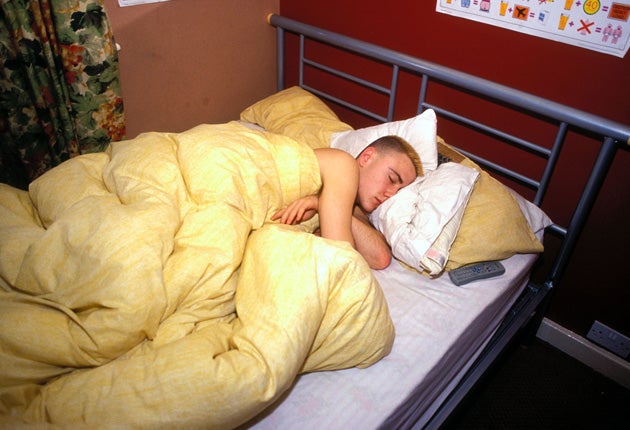To sleep, perchance to get better grades
A Tyneside high school is giving pupils a longer lie-in – in the hope it improves their concentration in lessons

It is what many teenagers tell their parents: "I'd do better at school if you'd only let me sleep in every morning." Now an 850-pupil comprehensive has taken students at their word and put back the start of the day in the hope they turn up better prepared for learning.
A five-month experiment was launched at Monkseaton High School in Whitley Bay, North Tyneside, after half-term with the backing of pupils, teachers and parents. Instead of traipsing into school bleary-eyed every morning at 9am, pupils can indulge in a big breakfast before starting lessons at 10am.
Before sanctioning the change, the headteacher, Dr Paul Kelley, took advice from sleep experts, in particular Russell Foster, a professor of circadian neuroscience at Brasenose College, Oxford.
In his research, Professor Foster has highlighted studies which suggest that teenagers coping with the onset of puberty need more sleep than the rest of the population. As a result, they are likely to be at their peak performance in the afternoon rather than the morning, and continuous interruption to their sleep patterns is likely to have an impact on their health and mental capacity.
Professor Foster's tests appear to confirm that students perform better in the afternoons. "It is time we stopped ignoring the sleep patterns of young adults," he said. "Sleep provides all of us with our sense of wellbeing and the faculty that helps make us human: our extraordinary capacity for creativity and innovation. It is cruel to impose a cultural pattern on teenagers that makes them underachieve. Most school regimes force teenagers to function at a time of day that is sub-optimal, and many university students are exposed to considerable dangers from sleep deprivation."
Speaking to The Independent, he welcomed Monkseaton High School's decision to postpone the start of the school day.
However, he stressed: "Knowing that kids want to go to bed and get up later, you can't just give them free rein. They have to take some responsibility for their own actions themselves. Knowing that they need nine-and-a-half hours' sleep, you should track that back from when they get up and make sure their room is dark with no TV on from then."
Initially, Dr Kelley wanted to make a more radical change to the school's timetable, pushing back the start time by two hours to 11am. However, a compromise deal saw it changed to 10am. Lessons carry on for an extra 30 minutes in the afternoons, with the school staying open for study until 5pm. "My view is that this is a very, very important issue because here is something that schools can do to improve the health and mental health of their pupils," Dr Kelley said.
Research shows that depression can set in if a human is constantly interrupted and woken from sleep.
The experiment has not won 100 per cent support from the school community and Dr Kelley pointed out that Monkseaton High still remained open from 8am until 5pm, so that parents with childcare problems, or families in which both partners had jobs, could still leave their child at school before going to work.
To further improve the standard of learning, the school has a £23m new building which, its pupils say, is designed like a football stadium. The classrooms are lighter and more spacious which help children to concentrate better in lessons.
Emelye Hood, 13, is a fan of the changes: "I get up about 8.30am to 8.45am and, with getting more sleep, it means I can concentrate more on my lessons."
Ryan Thompson, also 13, agreed. "I get a lie-in and you don't have to rush your breakfast in the morning," he said. "It means you don't get your lunch at school until 2pm but I don't mind that." But Connor Miller, 13, disagreed, saying: "I don't like the [new start] time because you get a bigger breakfast in the morning and you're not as hungry by lunchtime. I'd like to go back to the old time."
Dr Kelley said several schools in Canada and the United States had put back their starting times – but some had abandoned the idea because it was more difficult to fit in sporting fixtures with schools sticking to traditional timetables. He did not know of any in the UK doing what Monkseaton had done but felt it would "catch on" if the experiment was successful.
Join our commenting forum
Join thought-provoking conversations, follow other Independent readers and see their replies
Comments
Bookmark popover
Removed from bookmarks